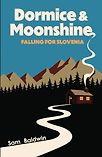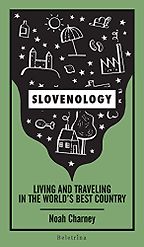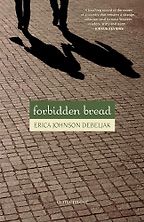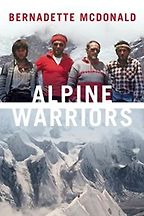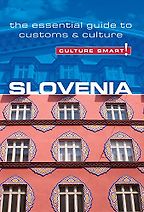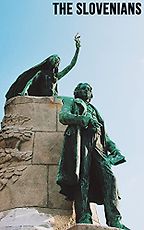Before we get to the books, for someone who doesn’t know anything at all about Slovenia, can you give us a few basics?
Slovenia is a petite country in Central Europe. It has just two million people and is smaller than the island of Sicily. It borders Italy, Austria, Hungary and Croatia and was part of Yugoslavia until 1991, when it became independent.
Despite being a member of the EU, NATO, the Eurozone, and the Schengen zone, it’s still relatively unknown yet it is – in my opinion – a wonderfully rare and unique place.
It has the organised, modern infrastructure of Western Europe, the laid-back lifestyle of Southern Europe, and a generous seasoning of Balkan spice; a Mediterranean coastline with hot summers, Alpine mountains with snowy winters, Tuscany-like terraced vineyards, and caves like Lord of the Rings.
You’ve travelled all over the world, how did you end up in Slovenia?
I’m from England, but since a young boy I’ve been obsessed with mountains and snow. In pursuit of them I spent a year working in British Columbia, Canada, a stint in backwoods Japan and, for many years, I lived in Scotland.
I always dreamed of having a little cabin to call my own, somewhere up high where the snow fell deep, and that’s how I stumbled upon Slovenia, when – after a long search – my brother and I bought a 300-year-old former-sausage-curing hut on the side of a mountain.
Visiting Slovenia every year to work on the house, I became more and more smitten with the exquisite mountains, the verdant meadows, the forests, and the people, and eventually, when the planets aligned, I moved there.
Let’s turn to your first book, Slovenology by Noah Charney. He’s an American professor who also caught the Slovenia bug and ended up at the University of Ljubljana. Is this the best book to start with for an overview?
So little has been written about Slovenia (at least in English), and I remember almost inhaling this book when it first came out, as I was so hungry for insight.
It’s a mashup of styles: part memoir, part guidebook and part collection of essays, and it’s certainly one of the best books to get an introduction to Slovenia.
The author – Noah Charney – writes with great affection for Slovenia where he has now lived for well over a decade with his family. He speaks the language well and is genuinely interested in the exploration of Slovenia’s people and places, which makes him an ideal guide.
We get to learn about different aspects of the country, for example the Slovene film industry, the Slovene writing style, Slovenian architecture and the Slovene drinking culture. Anyone with an interest in Slovenia should have this book on their shelf.
Let’s move on to Forbidden Bread, a memoir by Erica J Debeljak. This is an American who fell in love with a Slovenian poet. Tell me more.
Debeljak was living in New York when she met a handsome Slovene man at a cocktail party. She ended up moving to Slovenia with him, living in the capital, Ljubljana. She faces the classic struggles that foreigners take on when moving to a new country; the language, the bureaucracy, the differences in culture – and she writes very entertainingly, with great humour and honesty.
It’s a revealing and often poignant account of her relationship with her husband, her husband’s family, and Slovenia in general, and later, her experience of raising a family in a country that does some things quite differently to her American homeland.
An important aspect of the memoir seems to be the political stuff going on in the background: the transition from Communism, and also the breakup of Yugoslavia. Could you say a bit about that?
Most of the story takes place in the mid-nineties, when Slovenia was newly independent and transitioning from its socialist past to its democratic and capitalist present after the ten-day war in 1991. (Compared to the rest of the former Yugoslavia, Slovenia escaped largely unscathed with very little damage to people or property).
So the book provides a very interesting insight into this period of Slovenia’s history and what life was like during this time. I think Slovenia has changed quite a lot in the twenty years since but much remains the same and the book continues to make insightful and enjoyable reading for anyone curious about the country.
Your next choice looks brilliant, Alpine Warriors by Bernadette McDonald, about Slovenia’s mountain climbers. By 1995, all of the world’s 8000ers had been climbed by Slovenian teams. How did this tiny country manage it?
As a mountain lover, I was so happy when I stumbled upon this book. McDonald, a well-known author of Alpinist literature, has expertly told the story of Slovenia’s (and some of Yugoslavia’s) most famed climbers, during the 1970s through to the 1990s.
Though the book is primarily about adventures at altitude – avalanches, frostbite, and first ascents – the stories are set to a backdrop of what was happening in the country at that time, so it also offers interesting insight into everyday life in Slovenia during this era.
How did they manage such great feats of Alpinism? Well, you’ll have to read the book to get the full story, but in short, Slovenians have ideal training grounds – the Julian Alps, the Karavanke, the Pohorje mountains – which offer plenty of rock to cut your teeth on. And because of that, mountaineering is very much part of the Slovene mindset; my Slovenians friends are always climbing a mountain somewhere!
In addition, almost all the climbers of that era had the financial backing of the Yugoslavian government, which at the time, wanted to demonstrate the sporting prowess of the country. Mountaineering was a discipline they knew they could excel in. It’s a fascinating account, well told; I thoroughly enjoyed it.
Let’s look at Culture Smart: Slovenia by Jason Blake. Is it a guidebook?
Though the book does contain some recommended destinations it is not a travel guidebook per se, but a guide to what makes Slovenians, Slovene. It’s an expertly observed look at their quirks, their attitudes to money, to time keeping, to holidays, taboos, eating and drinking, and how the Slovenes behave at home, at work, and at play.
Written by a Canadian who has lived in Slovenia for over twenty years, there’s an undercurrent of humour running throughout which makes it very entertaining and anyone who has spent extended time in Slovenia will find themselves chuckling and nodding as they recognise many of the traits he alludes to.
As your fifth book, you’ve chosen The Slovenians: An A to Z of History’s Great Slovenes by John Bills. As many of us have only heard of Melanija Knavs/Melania Trump, it’s good to broaden our knowledge of famous Slovenians. Tell me more about the book.
This book is a dossier on 100 of the world’s greatest Slovenians (and that’s not even including Melania!). Though Slovenia has a tiny population, it has punched well above its weight in many fields – sports in particular, science, and writing as well.
Did you know that the first person to ski down Mount Everest was a Slovene? Or that the first person to swim the entire length of the Amazon was a Slovene? (I have met both men and recall their fascinating characters in my book).
The Slovenians details many more Slovenes who have gone beyond their borders in terms of their impact on the world; it’s well-written, laced with dry humour, and ideal for those who want to dig deeper into Slovenia’s people.
Finally, tell me about your book, Dormice & Moonshine, and how it fits in. It’s part memoir, part travel writing?
Dormice and Moonshine is a travel-memoir that begins with the true story of my brother and I buying a 300-year-old cabin on the side of a Slovenian mountain (that came with 300 problems).
As I slowly restored and renovated the house over the following decade, I fell in love with Slovenia more and more, and when the planets aligned following a breakup, I ended up moving to the country, living in the cabin as a heartbroken hermit.
The book takes readers on a journey deep into Slovenia as I start to build a new life there and explore the wild places and wild animals, the characters, the customs, and the cuisine of the country. I share my experiences of the bucolic side to Slovenia which initially seduced me – the beekeepers, dormouse hunters, moonshine makers – and the modern side which I unexpectedly ended up becoming part of; the tech startups, the bitcoin miners, and the businesses.
It’s also a deeper story of where life can lead when you chase a dream, jump into the unknown, and submit to serendipity.
Interview by Sophie Roell, Editor
May 23, 2024. Updated: June 28, 2025
Five Books aims to keep its book recommendations and interviews up to date. If you are the interviewee and would like to update your choice of books (or even just what you say about them) please email us at [email protected]
Five Books interviews are expensive to produce. If you've enjoyed this interview, please support us by donating a small amount.

